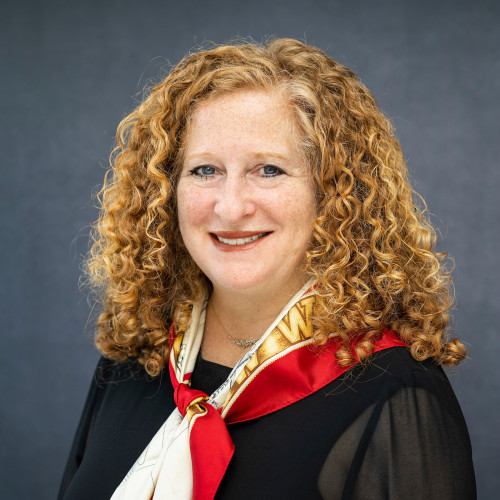Chancellor Mnookin joins 60 university leaders to advance civic preparedness and uphold free expression on campus
University of Wisconsin–Madison Chancellor Jennifer L. Mnookin is joining a consortium of 60 university leaders from across the nation to bolster higher education’s crucial role in preparing students to uphold free expression on campus, and to be engaged citizens while on campus and throughout their lives.
Through College Presidents for Civic Preparedness, a unique consortium designed by university leaders and convened by the Institute for Citizens & Scholars, participating presidents are dedicated to preparing the next generation of well-informed, productively engaged, and committed citizens; defending free expression, civil discourse, and critical inquiry as essential civic norms; and increasing thoughtful engagement and better understanding by students for the effective functioning of our democracy.

UW–Madison Chancellor Jennifer Mnookin Photo: Jeff Miller
The consortium, first announced with 15 members in August 2023, has grown significantly, demonstrating momentum for this movement.
“This is a pivotal moment in our country as public confidence in institutions, including institutions of higher learning, has meaningfully declined,” Mnookin says. “I look forward to working with my colleagues to exchange ideas about how best to encourage and support constructive engagement across differences in beliefs and backgrounds. This important work will both strengthen our students as learners and as citizens and strengthen our democracy.”
Participating presidents will take campus-specific and collective action, reflecting three shared Civic Commitments:
- Educating for democracy is central to our mission.
- We will prepare our students for a vibrant, diverse, and contentious society.
- We will protect and defend free inquiry.
The commitments stress inclusion as a strength of both American democracy and campus life and affirm the truth-seeking role of higher education through curiosity and inquiry. They also enable campus leaders to take substantive action to promote democratic engagement among students, with public accountability for progress through publication of an annual impact report.
Presidents are developing campus-specific programming to advance the Civic Commitments in 2024, including new courses, outside speakers, student orientations, presidential speeches, technology tools, and voter education initiatives. A complete listing appears on the consortium website. At UW–Madison, several programs are underway:
- The Discussion Project, founded in 2017, provides intensive professional development on how to create more engaging and inclusive classroom discussions. The project has served 1,200 instructors at UW–Madison and other campuses and teachers in schools in the U.S. and abroad.
- Deliberation Dinners, a pilot project of the Discussion Project, provides students the opportunity to engage in meaningful discussions with other students about important public issues in a setting that exposes them to multiple and competing ideas.
- The La Follette School of Public Affairs and the Milwaukee Journal Sentinel are collaborating to share insights on how Wisconsinites feel about important policy topics through a yearlong project called the Main Street Agenda. The goal of the campaign is to raise awareness of the issues that Wisconsin residents are concerned about in the lead-up to the 2024 presidential election.
- BadgersVote, an initiative that aims to equip UW–Madison students with the knowledge and resources necessary to be active participants in democracy. The BadgersVote Coalition is comprised of many cross-campus units and departments, and partners with the city of Madison.
“Higher education has a responsibility to provide students with critical civic skills and knowledge to participate effectively in our constitutional democracy,” said Rajiv Vinnakota, President of the Institute for Citizens & Scholars, a nonprofit that cultivates talent, ideas, and networks that develop young people as effective, lifelong citizens.
College Presidents for Civic Preparedness has been supported by ECMC Foundation, Einhorn Collaborative, John S. and James L. Knight Foundation, One8 Foundation, Arthur Vining Davis Foundations, Lumina Foundation, Charles Koch Foundation, and Teagle Foundation, with individual campuses providing support for their own related projects.



